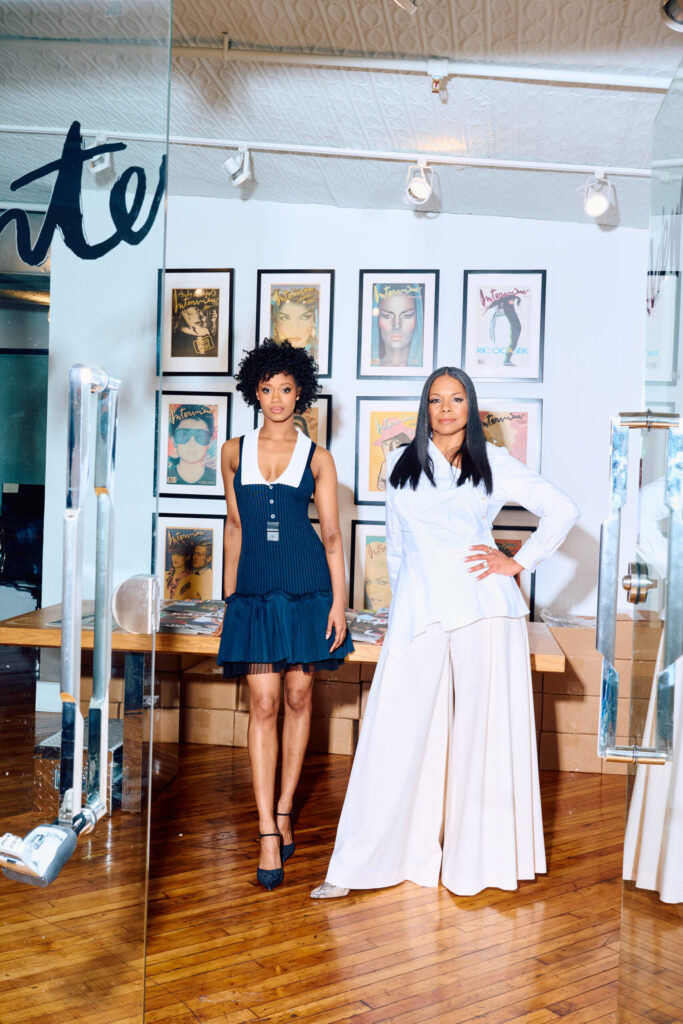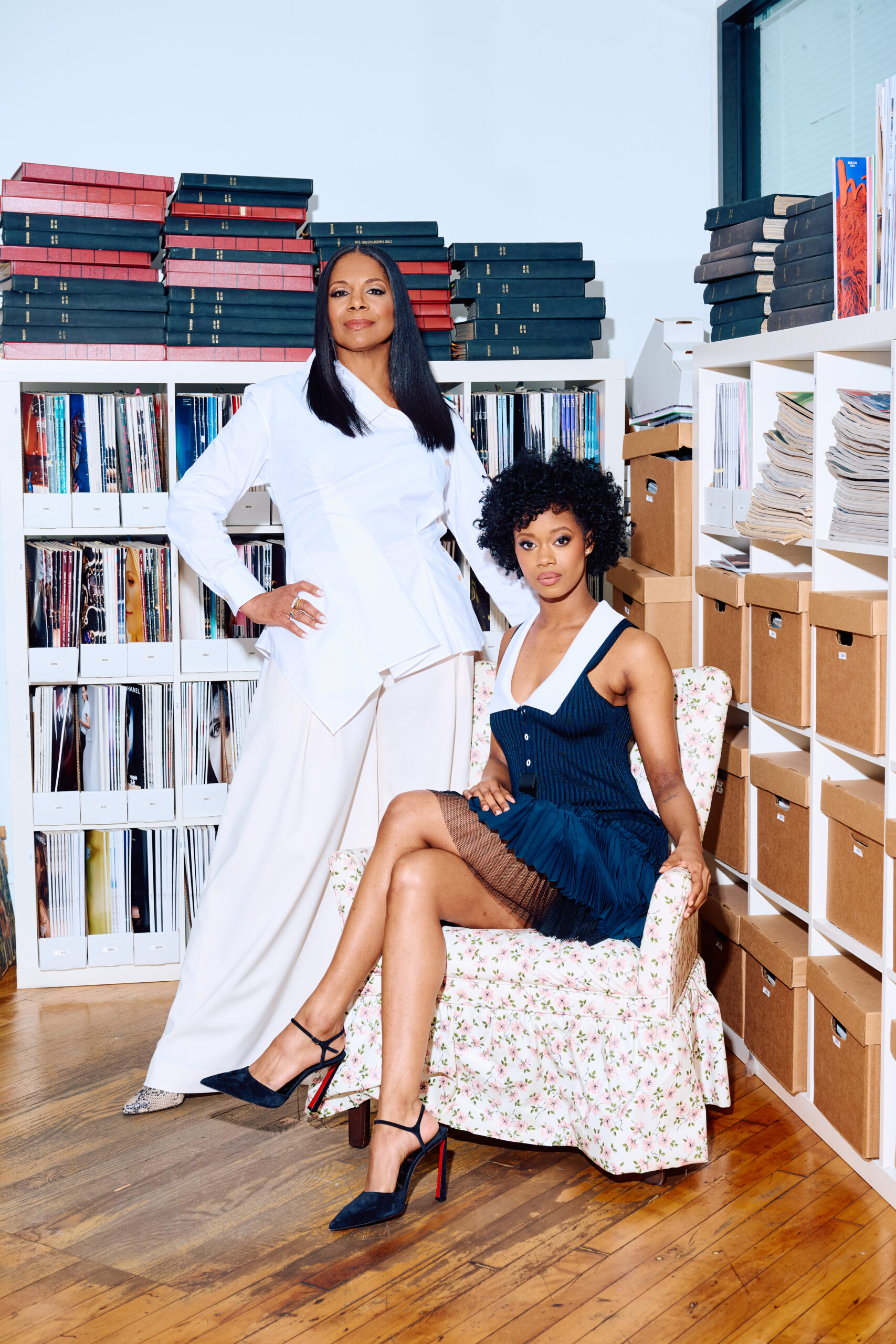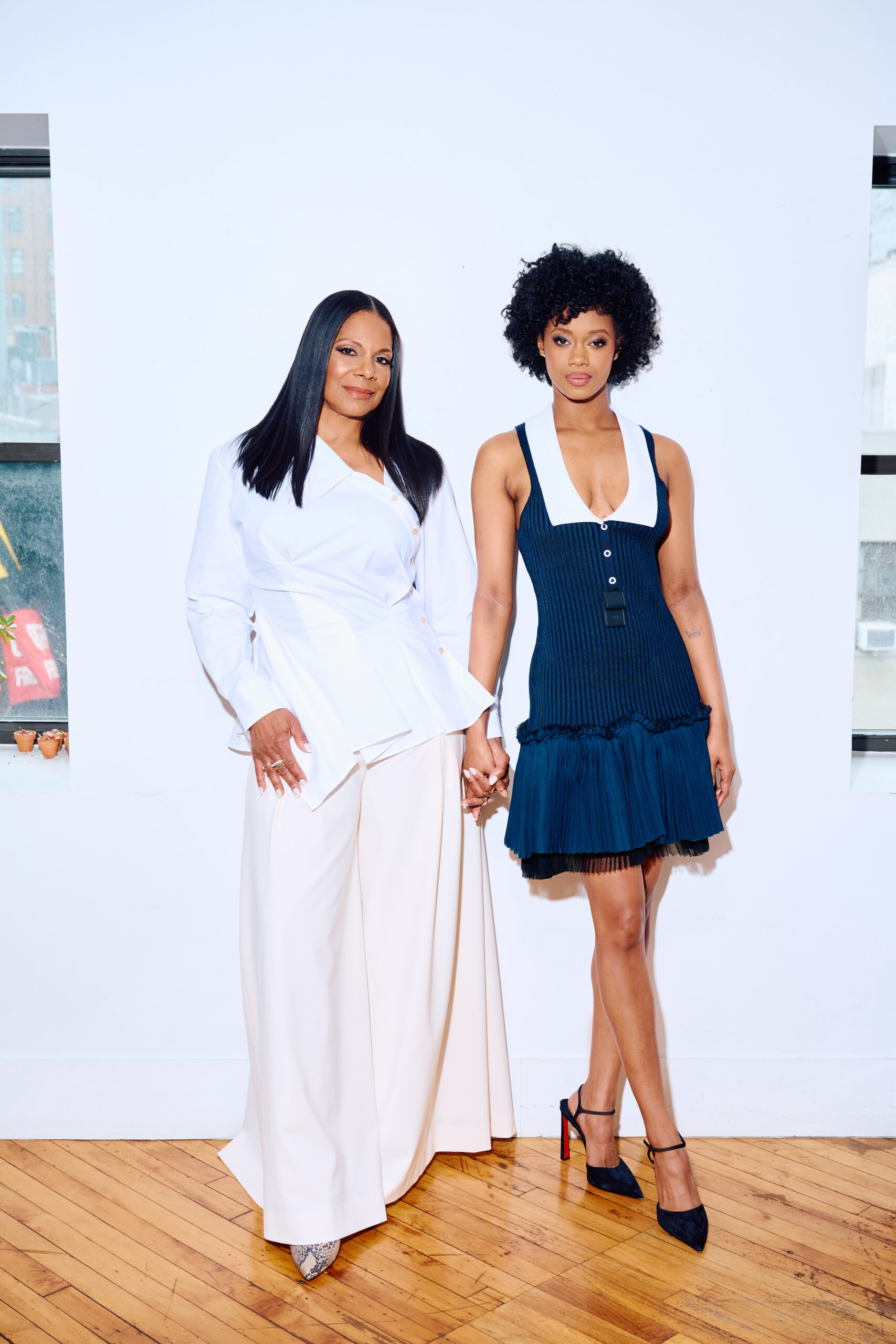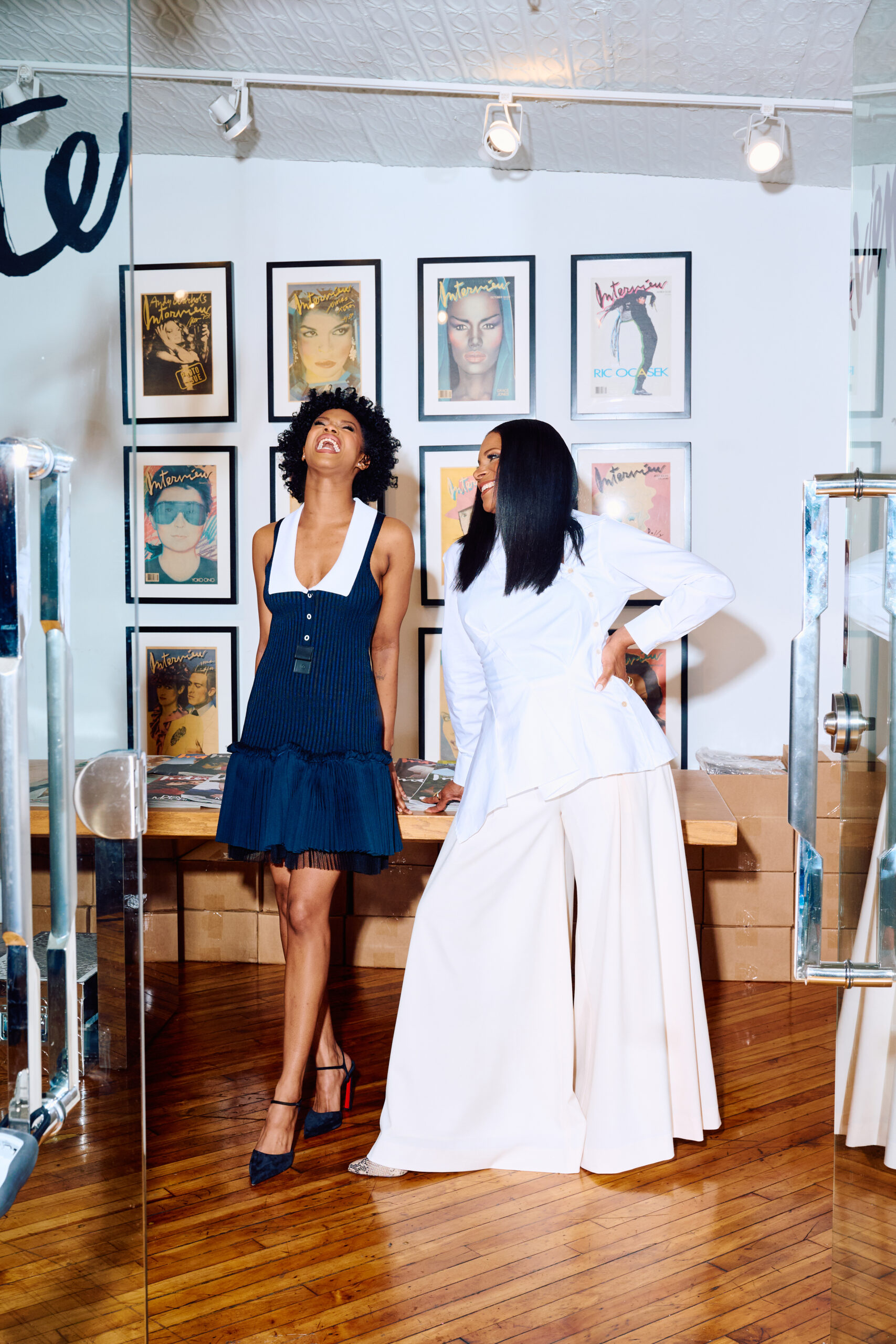By all accounts, the main event this Broadway season is director George C. Wolfe’s revival of Gypsy, starring six-time Tony Award winner Audra McDonald as the ambitious, overbearing, and fiercely protective Mama Rose. It’s a punishing, seismic role that’s been played by a true murderer’s row of Broadway divas—including Ethel Merman, Bernadette Peters, and, of course, Patti LuPone—but McDonald, the first Black actor to play Rose, was determined to interpret it anew. “I can’t chase after a Rose that sat in Patti’s body or Bernadette’s body, because that’s wrong for me,” she told Joy Woods, who plays Louise, when the co-stars stopped by the Interview offices earlier this month. “I have to find who she is in my body and in my spirit and in my soul.” For Woods, who made her Broadway debut in Six three years ago, getting to perform alongside McDonald eight times a week has been nothing short of an education. As early as last spring, when Woods took Broadway by storm with her 11 o’clock number in The Notebook, she began seeing promotional materials for the Gypsy revival on charging stations around the theater district. “I was like, ‘Oh my goodness. Audra, Gypsy, I cannot wait to see it,’” she recalled. “Never did it cross my mind to be a part of it.” Now, several months into the run, both McDonald and Woods are primed for recognition when Tony nominations come out later this week. To take in the moment, they joined us for a wide-ranging conversation about their “no-ego cast,” playing mother and daughter, and, of course, seasonal allergies.
———
AUDRA MCDONALD: What’d you do today?
JOY WOODS: I woke up and I opened two gifts that I was given this morning by the Lord, and they were my eyes. Then I got up. The party yesterday was so much fun.
MCDONALD: Oh, it was?
WOODS: It was literally just a drag show and the children—
MCDONALD: Doing all of Gypsy?
WOODS: The entire show, and we just sat and cheered them on. Jayden [Theophile] doing “Everything’s Coming Up Roses” is seared into my brain. I didn’t know if he was Rose or if he was Effie White or if he was Mr. Brown, but he was somebody.
MCDONALD: I’m sorry I missed it. But these allergies, man. By the end of the show, I couldn’t get a deep breath. And then, when I walked offstage, I realized that my lungs and my chest were all hurting, like I had asthma or something. So I was like, “I need to go home and take my Singulair and get a little whiff of an inhaler or something.” But it sounds like it was fun.
WOODS: There were so many videos taken, so you will see. I knew they liked to have a good time, but I didn’t know all that.
MCDONALD: Well, now you’ve heard that Gypsy album. What was the first Gypsy album you ever heard?
WOODS: I didn’t know Gypsy further than it being on TV once when I was a kid, the Bette Midler TV version. “Some People” was on when I walked into the room where it was playing and the tune was just stuck in my head. I didn’t know where it was from or any of that for years until I got to college and all the theater queens were telling us about Gypsy. I’m like, “Oh, I know that song.” And then you see what the people in the movie and on stage look like, so you’re like, that’s something I’ll never be a part of. I can just appreciate it as something and never aspire towards those roles in any sort of way.
MCDONALD: And looky here. Look at you. Look at god, girl, look at god.
WOODS: An Uncle Jocko kid!
MCDONALD: Yeah, I was an Uncle Jocko kid in my dinner theater in Fresno, California. We did our little cabaret and then we stuck around and got into our little Uncle Jocko costumes, did the first scene of the show, and then our parents picked us up and took our butts home. So I never even saw the end of the show; I didn’t even see the end of the first act.
WOODS: The kids here have to wait the whole three hours.
MCDONALD: So that was my first actual experience with Gypsy. But then afterwards, it was obviously seeing Bette Midler’s version, seeing Tyne [Daly] because I was here in the ’80s when she did it. And then, of course, seeing the movie with Rosalind Russell and then seeing Patti [LuPone] in 2008. I don’t think I did get a chance to see Bernadette [Peters]. Do you want to share a little bit about how you became a part of this production, how we tortured you on your way to being a part of it? Well, we didn’t torture you, but—
WOODS: Do you take Cigna? [Laughs] ‘Cause I could go on. I think when I found out that they were doing this, there were rumors circling, as they do, and when they made the actual announcement, it was a Wednesday and we had just gotten out of the matinee of The Notebook. Marketing was very quick because the poster was on the little charging stations on 8th Avenue. I was like, “Oh my goodness. Audra, Gypsy, I cannot wait to see it.” Never did it cross my mind to be a part of it. Louise is for an actor, an actress, and I felt like I was very much still in the beginning. Six and Little Shop [of Horrors] and Dreamgirls, those are roles that happened very quickly so I didn’t get time to learn about acting rather than just performing and making it look like it reads, rather than going toes up here, which is what I feel like Louise requires.
MCDONALD: You are an actress. And the thing is, I see so much of myself in you. There’s some reason we want to invalidate our experience on stage and say that that doesn’t count when it comes to real acting or big roles or anything like that. But every moment on stage is a lesson. I am rarely a part of the audition process, but they thought it was important that I’d be a part of that one just because we had to have chemistry. And you had it right then, girl. That’s all I’m going to say. This is me mama-ing you. It was like, “Okay, well there she is. We’ve found her.” It was a great, great moment for us.
WOODS: In terms of where I’m at in the run right now, maybe over the past few weeks, I feel like I know what’s going on. Of course, we’ll continue to figure out what’s going on and then you look back and say, “Oh, boy, back then I did not know what was going on.” But does that happen for you?
MCDONALD: It’s constant, it’s ever-changing. You go through days where you’re like, “Oh, I really understand,” and then you’ll have weeks where you’re like, “I am not hitting any new veins,” even though your endeavor is to be fresh and new and present. I don’t want to call them tricks, but there are things that I know I can rely on to help bring me back into the moment. Listening, that’s a big one for me. Listening and breathing. And my husband and I always talk about looking left instead of right, just turning your head in a different direction while, all of a sudden, forcing yourself into the present.
WOODS: That’s good, that’s good.
MCDONALD: I’ll read an article about something or a news story will come up, something about a mother, something that might have something to do with Gypsy, although very tangentially, and then it’ll spark something and the character drops a little lower in me. The hope is that, by the end of the run, you get it down as far down as you possibly can. But honey, there are things in Lady Day [at Emerson’s Bar & Grill] that I think about now like, “Oh, I should have done this,” and that was, what, 11 years ago? Right now, I feel like Rose is about here for me, right above my chest, and by the end of the run, I hope she’s all the way down to—
WOODS: I’m hoping for the same. Hoping to get them at least to the sacral chakra, yes.
MCDONALD: Even having George [C. Wolfe] yesterday giving us notes, I texted Danny [Burstein] right before the show began last night and said, “I’m really, really nervous right now in a way that I hadn’t been before.” I always have a little stage fright, but this was, “Oh, I don’t know what I’m doing.” And it was because George had given us notes. They were good notes, but then you go back into your head.
WOODS: Yeah.
MCDONALD: It can slip into your head like, “Oh, so that means everything that I had been doing was wrong.” You know what I mean? And Danny said, “I get you, I’m feeling the same way. Let’s just try and take the notes and go out there with gusto, like we do, and try and tell the story.” And then by the end of the night, I was really happy that George had given us those notes because it forced me into the present again. It reminded me of certain ways to go about getting what Rose needs and of the foundational reasons that she needs what she needs.
WOODS: Yeah, I completely agree. And knowing how I felt walking into the production, I felt like I was given so much grace and patience, almost beyond what I would’ve liked. I understand why now but boy, oh, boy, feeling like everybody around me knows what’s going on and I missed the meeting. I’m always very grateful when it comes to giving notes, especially feeling like I only got it down within the past month. I look up to you and Jordan [Tyson] and Danny so much. You’re so free and active; you live in it and are free in it rather than doing the same show every time.
MCDONALD: You don’t do the same every time. And I always say we have a safe, trusting space within the four of us that allows us to play, and I’m so grateful for that. Sometimes you get acting partners who work a little bit differently. Like, “It has to be this. You had your left foot a little over and that ruined my entire show.” But for me, I feel like it’s, “I hit the ball to you, you hit it back to me and, Danny, he hits it back and Jordan smashes it back.” That’s where discovery happens, I think, and I love it.
WOODS: Which is why I’m happy that George came.
MCDONALD: So, to what extent, if any, have you looked at past productions to inform you?
WOODS: I watched the 2008 version about two weeks ago. That was the first time I’ve seen another Gypsy in its entirety.
MCDONALD: Wow. What was that like for you?
WOODS: It was interesting to see another production. It was also at a time that I really should not have been watching it, where I was feeling extremely low and looking for guidance and then I saw a completely different context of the show. And of course, Laura [Benanti] won the Tony for this previous Louise, and that will get in your head if you’re not in the right spot to be taking that sort of information in. But it was so funny, this is a knee-slapping comedy and then a heart-breaking drama and everything in between, all in one. It was just nice to have a bird’s eye view on what the piece is as a whole. I thought it was really wonderful.
MCDONALD: Yeah, it was. I saw it live and it was incredible. And what I love about Gypsy, because I’ve seen quite a few versions of it, is that it’s so beautifully constructed, such a masterpiece, that it can take many interpretations without falling apart. It’s a story about a mother and her daughters, it’s a story about want, it’s a story about lack, it’s a story about abandonment, it’s a story about trust, it’s about all the human things. It’s a story about chasing joy and dreams. I’d seen a lot of productions and they were all in my head for a while and then, once we started rehearsal, it was like, “Okay, you all gots to go.”
WOODS: Yeah.
MCDONALD: I have to figure out who Rose is in Audra’s body now. I can’t chase after a Rose that sat in Patti’s body or Bernadette’s body or Imelda [Staunton’s] body or Ethel [Merman’s] body, because that’s wrong for me. That means that I am Audra McDonald trying to play Patti LuPone trying to play Rose, and that makes no sense. I have to find who she is in my body and in my spirit and in my soul. That was a big part of those previous productions for me, having known them and revered them and loved them, and then having to then chase them out of my brain.
WOODS: It’s funny that you say that, because I feel like watching the productions gave me permission to do that. I think not watching them had created this looming cloud of what I could or should have been doing. But once I actually saw even just a piece of the Gypsy zeitgeist, it confirmed that I just need to put this in my own body, like you said.
MCDONALD: And in the end, that’s what the audience responds to. If you’re pretending to be some other person who played this part, they see that there’s no authenticity to that.
WOODS: I feel very, very lucky. And Jordan and I, we both feel very protective of each other. And women in theater, Black women in theater, there’s always going to be some pitting against each other from outside sources, and we’ve received a lot of that. But being able to hold each other and lift each other up has been my grounding space for a lot of this time.
MCDONALD: That’s wonderful. And I feel like this is a no-ego cast, too. We all want to be there, we all want to tell this story. In some ways, some of my most favorite moments are the moments where we’re playing in character offstage, where the audience doesn’t even see what we’re doing but we’re still trying to keep that story alive. That feeds me and fills me.
WOODS: And I always believe that good people get put in good companies.
MCDONALD: I like that.
WOODS: I can identify it as a really, really special group because I can walk around and loudly and proudly say, “Do we have to? I don’t want to do this show today,” and everybody knows that I’m not being bitter and I’m not saying I genuinely don’t want to be here, just that it would be awesome if I could do the show wholeheartedly on a cot. You can be tired as long as you want but, at the end of the day, if I chose to go to bed and I knew that the downbeat was at 7:02, I would be sitting up in my bed, biting my fingernails, wishing I were there.
MCDONALD: Well, we’ll be there in just a few hours. Speaking of, I have to shower and get my daughter from the bus so that I can then get in the car and come down to see you.
WOODS: You got so much going on, missy.
Content shared from www.interviewmagazine.com.




